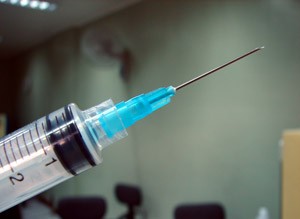Washington rider had tested positive for DHEA, receives additional 103 day penalty
 Masters rider Kenny Williams has had additional time added to the two year ban he received for a 2009 doping offence, thanks to his decision to compete during his period of ineligibility.
Masters rider Kenny Williams has had additional time added to the two year ban he received for a 2009 doping offence, thanks to his decision to compete during his period of ineligibility.
The 43 year old was originally handed a lengthy suspension after he tested positive for an anabolic agent during the US Masters National Championship on August 21st 2009. However, despite being aware that he couldn’t compete during that period, the Washington State rider took part in the Seward Park racing series on April 15 of this year.
According to a statement released by USADA today, he has been handed a sanction because of that. “As a result of the violation, Williams accepted an extension of his ineligibility period equal to one half of the time served since his sanction commenced September 21, 2009,” it said. “As a result, Williams’s ineligibility period, which was set to expire September 20, 2011, is extended 103 days until January 3, 2012. Williams’s results from the April 15, 2010 Seward Park racing series have also been disqualified.”
Williams took a national criterium title in 1999 and since then took a number of Elite track medals. He claimed the 3000 metre pursuit and the kilometre TT titles in the 2009 Masters track championships, but tested positive for the steroid Dehydroepiandrosterone (DHEA).
He released a statement after that incident, claiming that he used DHEA to try to regain form after breaking his left collarbone in June 2009. “I am ashamed that I’ve done something that hurts the sport of cycling and the community of people who have become the most important part of my life,” he said. “I’m facing the very real possibility that I can try for the rest of my life to regain the confidence of the cycling community and my friends, but this cloud will be with me for the rest of my life.
“I am not asking for forgiveness, because I am admitting to my mistake and own all the horrible feelings that come with my bad decision. I am hoping for compassion and understanding. Compassion that I never intended to hurt anyone and understanding that if I could have one re-do in my life that this would be it. As I have done throughout my whole athletic life I will fight to re-gain my reputation as a fair man, tough competitor and drug-free cyclist. You can trust me when I say that I will never take a short-cut like this ever again.”
However it appears he did just that, taking a short-cut in the sense of riding races that he shouldn’t have been competing in.
Williams was actually eligible for a stiffer penalty after breaking his ban. Under the WADA Code, riders who race during this period can either have the sanctions restarted from scratch, or alternatively can be required to serve an additional suspension equal to the length of the time between their ban and when they competed.
However Williams’s penalty is equal to just half of the latter period. The 103 day extension he was handed was the maximum reduction of the extension period allowed under the Code. USADA did not explain why it had given him a reduced penalty.
The agency is currently investigating claims of alleged doping on the US Postal Service and Rock Racing teams. One possible reason for Williams to get a reduced sentence would be if he provided information relevant to this or any other investigation. However unless he or USADA clarifies the matter, it is difficult to know why he was given that concession.